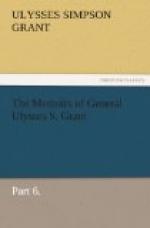I was so much dissatisfied with Warren’s dilatory movements in the battle of White Oak Road and in his failure to reach Sheridan in time, that I was very much afraid that at the last moment he would fail Sheridan. He was a man of fine intelligence, great earnestness, quick perception, and could make his dispositions as quickly as any officer, under difficulties where he was forced to act. But I had before discovered a defect which was beyond his control, that was very prejudicial to his usefulness in emergencies like the one just before us. He could see every danger at a glance before he had encountered it. He would not only make preparations to meet the danger which might occur, but he would inform his commanding officer what others should do while he was executing his move.
I had sent a staff officer to General Sheridan to call his attention to these defects, and to say that as much as I liked General Warren, now was not a time when we could let our personal feelings for any one stand in the way of success; and if his removal was necessary to success, not to hesitate. It was upon that authorization that Sheridan removed Warren. I was very sorry that it had been done, and regretted still more that I had not long before taken occasion to assign him to another field of duty.
It was dusk when our troops under Sheridan went over the parapets of the enemy. The two armies were mingled together there for a time in such manner that it was almost a question which one was going to demand the surrender of the other. Soon, however, the enemy broke and ran in every direction; some six thousand prisoners, besides artillery and small-arms in large quantities, falling into our hands. The flying troops were pursued in different directions, the cavalry and 5th corps under Sheridan pursuing the larger body which moved north-west.
This pursuit continued until about nine o’clock at night, when Sheridan halted his troops, and knowing the importance to him of the part of the enemy’s line which had been captured, returned, sending the 5th corps across Hatcher’s Run to just south-west of Petersburg, and facing them toward it. Merritt, with the cavalry, stopped and bivouacked west of Five Forks.
This was the condition which affairs were in on the night of the 1st of April. I then issued orders for an assault by Wright and Parke at four o’clock on the morning of the 2d. I also ordered the 2d corps, General Humphreys, and General Ord with the Army of the James, on the left, to hold themselves in readiness to take any advantage that could be taken from weakening in their front.
I notified Mr. Lincoln at City Point of the success of the day; in fact I had reported to him during the day and evening as I got news, because he was so much interested in the movements taking place that I wanted to relieve his mind as much as I could. I notified Weitzel on the north side of the James River, directing him, also, to keep close up to the enemy, and take advantage of the withdrawal of troops from there to promptly enter the city of Richmond.




